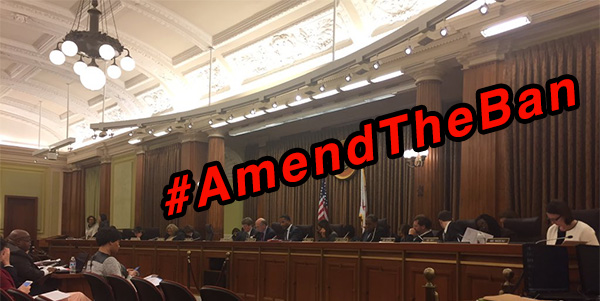ATTENTION DC VOTERS:
Near the end of last week’s DCMJ Planning Meeting #14, it was suggested that since we aren’t meeting until the day after the November 6 midterm election, DCMJ community should put forward local candidate recommendations for DC voters.
For each of the offices that DC voters will choosing to elect either the incumbent or a challenger, we asked everyone at the meeting to put their thumbs up (endorse – vote for them!), thumbs sideways (neutral), or thumbs down (don’t vote for them). For some candidates there was no consensus, while other candidates DCMJ members were unanimous.
Below are the results:
Delegate Eleanor Holmes Norton – THUMBS UP
With her leadership on cannabis reform in Congress, specifically her introduction of H.R. 6152, the “Sondra Battle Cannabis Fair Use Act” last summer, there was consensus that DC voters should re-elect Congresswoman Norton.
Mayor Bowser – THUMBS SIDEWAYS
While many in the room support her recent effort to stop police from arresting people for public consumption of cannabis, they were unhappy that she has allowed Police Chief Newsham to continue to go after popups. There was no consensus to give her thumbs up or thumbs down, so she received a thumbs sideways.
Chairman Phil Mendelson – THUMBS DOWN
Everyone in the room gave DC Council Chairman Phil Mendelson a thumbs down due to his past decisions on making public consumption of cannabis a crime instead of a civil penalty and for supporting the ban on social clubs. On the ballot, voters can choose the Libertarian Party’s Ethan Bishop-Henchman instead of Mendelson. Everyone at the DCMJ meeting was aware that he’ll likely be re-elected. That doesn’t mean cannabis activists should not stopping pressuring the Chairman to listen to cannabis users when setting public policy. There will likely be more cannabis reform legislation before the DC Council in the next two years, and the DCMJ community will need to continue to be open to working with the powerful Chairman to ensure we get the fair laws.
At-Large Councilmember Elissa Silverman – THUMBS UP
DC voters have the opportunity to vote for TWO At-Large Councilmembers, not just one. While there are 6 different candidates running for the At-Large Councilmember positions, there was only consensus around incumbent Elissa Silverman. It was felt that she was a consistent independent voice on the DC Council and continues to support cannabis reform. If you vote just for her, your vote will be weighted more heavily than if you vote for her and another candidate. There was a lot of discussion about endorsing incumbent Anita Bonds but her flip-flop on the social club vote, showed us that she is indifferent to cannabis reform and not worthy of DCMJ member’s endorsement.
Ward 1 Councilmember Brianne Nadeau – THUMBS UP
If you live in Ward 1, you will be able to vote for Councilmember Nadeau. She has been a long-time advocate for cannabis reform (even attending one of the DC Cannabis Campaign’s first fundraisers!) and her past votes showed us that she will continue to support cannabis reform.
Ward 3 Councilmember Cheh – THUMBS SIDEWAYS
If you live in Ward 3, you will be able to vote for either Councilmember Mary Cheh or independent candidate Petar Dimchev. Based on the Ward 3 voters at the meeting, we could not come to a consensus on supporting Mary Cheh, so she has received a Thumbs Sideways.
Ward 5 Councilmember McDuffie – THUMBS DOWN
If you live in Ward 5, you will have the option of choosing 1 of 4 candidates. Based on the Ward 5 voters at the meeting, they were unanimous in their position that voters should NOT vote for incumbent Councilmember McDuffie. Moreover, DCMJ members also suggested that Ward 5 voters should also NOT vote for Kathy Henderson. McDuffie and Henderson have long records of being against common sense cannabis reform, so voters should consider voting for either Joyce Robinson Paul or Amone Banks.
Ward 6 Councilmember Allen – THUMBS UP
If you live in Ward 6, you have the option voting for Republican Michael Bekeska or incumbent Democrat Charles Allen. The consensus of the DCMJ members at last week’s meeting was to support incumbent Charles Allen.
Attorney General Karl Racine – THUMBS UP
Based on his support for Initiative #71 and his continued support for cannabis reform, DCMJ members were in consensus for keeping AG Racine in office.
Shadow Senator Michael Brown – THUMBS UP
Based on his support for Initiative #7q and his continued support for cannabis reform, DCMJ members were in consensus for keeping Shadow Rep. Brown in office in order to continue to lobby for DC Statehood.
Shadow Representative Franklin Garcia – THUMBS UP
Based on his support for Initiative #71 and his continued support for cannabis reform, DCMJ members were in consensus for keeping Shadow Rep. Garcia in office in order to continue to lobby for DC Statehood.
IF’s…
If you are not registered to vote, DC has same day voter registration, so you’ll be able to vote on election day. Click here to find your polling place. You should have received the DC voter guide in the mail, but we hope the guide above is helpful in choosing the candidates who support cannabis reform.
If you want to get involved in any local campaigns, click here to download the DCBOE candidate list, which has the contact information for all the campaigns.
If want to help get Rep. Andy Harris out of office in the 1st District of Maryland, there will be a caravan leaving DC on Monday, November 5 to ensure DCMJ members are able to work the polls on the Eastern Shore of Maryland bright & early on election day. Please email Kris@MDMJ.org to get involved!
